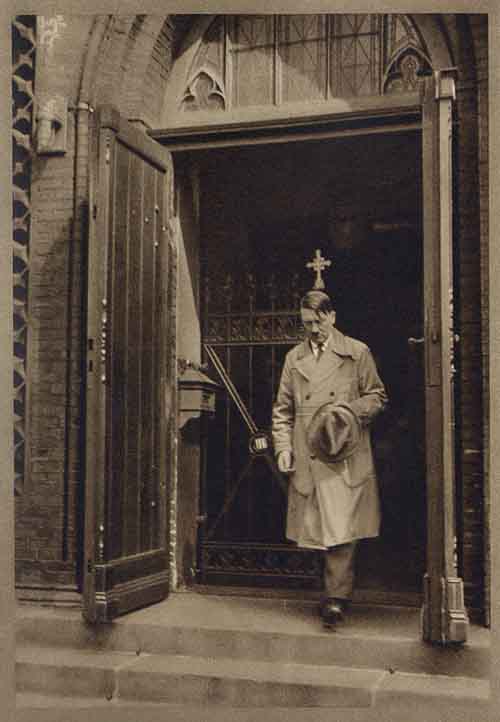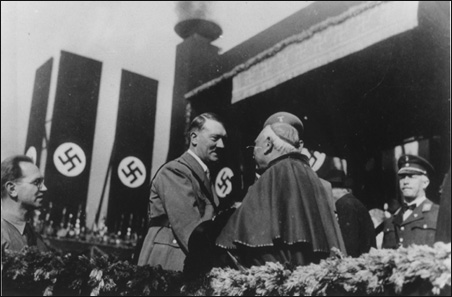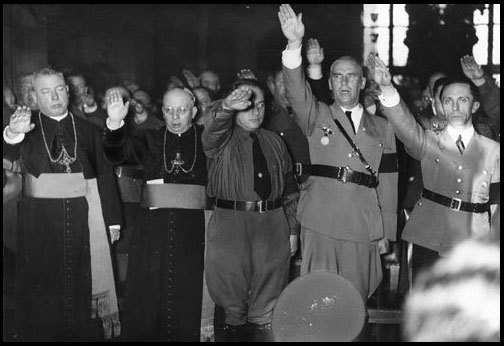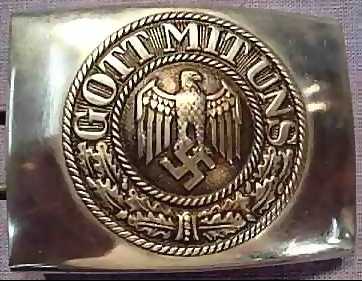A Theist Strikes Back: A Conversation with Dinesh D'Souza
by Benjamin D. Wiker
3/11/10
Christianity is under attack -- in the media, in the academy, and in the culture. With his book, What's So Great About Christianity, Dinesh D'Souza meets this wave head on with his characteristic wit and erudition. Benjamin Wiker spoke with D'Souza about his role as a Christian apologist.
♦ ♦ ♦
Benjamin D. Wiker: What's So Great About Christianity seems to be something of a departure from your previous books. How did a political and cultural pundit become a Christian apologist?
Dinesh D'Souza: I began this book as a secular exploration of the way in which Christianity has shaped America and the West. I wanted to show that Christianity is the foundation of the central institutions of the West, such as democracy and human rights. I also wanted to demonstrate how Christianity has shaped values that even secular people cherish, such as compassion and respect for the equal dignity of all people.
Then the atheist books began to hit the shelves, one by one. First Sam Harris with The End of Faith, then Richard Dawkins with The God Delusion and Christopher Hitchens with God Is Not Great. There have been several other books, too, by Daniel Dennett, Victor Stenger, and Steven Pinker. Here I encountered a much more belligerent and far-reaching attack on God and Christianity. These men claim that Christianity is not only irrational but also evil. We are seeing a newly confident atheism that is no longer content to sullenly deny God but wants to drive religion completely out of the public square and destroy its intellectual and moral legitimacy.
So I went back to the drawing board and produced this book. It's written in the C. S. Lewis tradition, as a defense of traditional Christianity -- what Lewis calls "mere Christianity." I meet the atheist arguments on their own terms and attempt to answer them with logic and reason and science. I don't shy away from the atheists' favorite weapon: skepticism. Only I apply this skepticism to atheism itself.
This is a new kind of book for me. I've written seven books, and they have all been secular. This is my first explicitly religious book.
BW: Village Atheists Dawkins, Hitchens, and Harris have been dominating the New York Times bestseller list. Why do you think that is? Aren't we, after all, a Christian nation?
DD: One reason is 9/11. The atheists have cunningly capitalized on it, arguing that this is a war with Islamic fundamentalism on one side and Christian fundamentalism on the other. The term "fundamentalism" is used very loosely here. It's a Christian term and doesn't apply very well to Islam. Even so, it's used to describe the Islamic radicals. By Christian fundamentalism the atheists don't just mean Jerry Falwell or Pat Robertson; they also mean the pope and the Catholic bishops and really all traditional Christians. By setting up the war as a clash of competing fundamentalisms, the atheists can then argue that both camps are fueling their fanaticism at the same holy gas station. In other words, religion itself is the problem.
A second factor is the rising influence and prestige of technological gadgetry in our society. The computer revolution has not only enhanced the role of science, it has created a new tech community. This community views science as the real source of miracles, and views religion not only as an enemy of rational thinking but also of moral freedom. These are people who are scientific in their mindset and bohemian in their morals. So the new atheists have found a receptive constituency.
BW: Turning to your own book: You make the surprising claim -- at least to some -- that the latest modern science supports theism. But Dawkins, Hitchens, Harris, and a raft of lesser minions all claim the reverse, that science has now all but disproved God's existence.
DD: Think of how silly this is. Christianity posits a God who is not a material thing but rather a spiritual being, outside of space and time. Now how would science go about disproving the existence of such a being? What laboratory experiments can be concocted to discover whether such a being exists or not? The point is that no material test can ever prove or disprove the existence of God. Christopher Hitchens thinks he is being very scientific when he argues that "the absence ofevidence should be taken as evidence of absence." But this is manifestly irrational. If I have no way of knowing through scientific tests whether there is life after death or not, if no test can possibly establish the proposition one way or another, I cannot simply conclude from that that there is no life after death. I can only conclude that I haven't figured out how to get a scientific answer to this problem. My inability may reflect as much on the limitations of science as it may reflect on whether there is actually life after death. The comedy of modern atheism is that it marches behind the banner of reason without investigating the parameters of reason. First you must ask what reason is capable of knowing.
The good news is that what modern science has discovered in the past century strongly supports theism. This is a great reversal: For the past 300 years, from Copernicus through Newton and all the way to Darwin, the findings of modern science seemed to pose problems for religious belief: The earth is not the center of the universe; the universe operates as a kind of machine with no room for divine intervention or free will; one life form evolved from another. It seemed as if atheism was on the march and theism was on the retreat.
But with the discoveries of 20th-century physics and astronomy, the situation is now very different. Modern science has figured out that the universe -- not only matter but also space and time and even the laws of physics -- had a beginning. Modern science recognizes that we live in a universe that seems precisely fine-tuned for life. Atheists try to account for these developments within a secular framework, but they have to jump through incredible hoops and spin out implausible fairly tales. This is what I call faith-based atheism.
BW: According to your book, though, the atheists are not just wrong, they're ungrateful -- that is, historically, Christianity is not only the foundation of Western culture but science as well.
DD: I'm not just making the point that most of the great scientists of the past 500 years, from Kepler to Boyle to Copernicus to Newton, were Christians. Nor am I content with pointing out that the churches were the institutions that sponsored most of the observatories and many of the scientific academies. My point is deeper: Modern science itself is based on a theological assumption that derives from Christianity. This is the assumption that the universe is rational, and that it obeys laws, and that these laws apply throughout the universe, and that they are accessible to the human mind.
None of these propositions is eitherself-evident or even scientifically necessary. There's no reason the universe must be rational or that laws must be uniform, or even that the workings of our mind should mirror the laws of nature out there. But in Christianity the laws of the universe are viewed as reflecting the rationality of God. In Christianity, humans are seen as able to decipher the rationality of creation because we are made in the image of God, the creator. So these are not only the historical foundations of science; they are the operating assumptions of science even today. Contemporary science would grind to a halt if it gave up these Christian assumptions.
BW: You take particular care to reopen the Galileo case. Why?
DD: Because it is the key exhibit in the folder of those who want to posit a war between science and religion. This story of an ongoing war is mostly a fable, but it is a fable sustained by famous episodes that turn out not to be true. "The medieval Christians thought the earth was flat." Actually, they knew the earth was round.
But nothing better illustrates atheist propaganda than the Galileo case. By reopening it, I draw on modern scholarship to show that virtually everything we think about the Galileo case is wrong. The bottom line is that Galileo was not, as the atheists would have it, a secular martyr to the cause of science. When readers find out the truth about the Galileo case, they will see the whole concept of a "war" between science and religion in a new way.
BW: You also step into the muddied and turbulent waters of evolutionary debates. What is your take on the controversies in regard to evolution, the intelligent design movement, and the debate about human origins? Just what should a Christian think about evolution?
DD: The first thing is to realize that evolution in no way imperils the truth of theism or Christianity. Even skipping over some of the problems with evolution, the theory claims only to account for how one life form transforms into another. Evolution does not even pretend to account for the origin of life. Nor can evolution account for the emergence of consciousness. Nor, despite some Herculean efforts, can evolution explain morality.
Atheists like Richard Dawkins think that evolution refutes the argument from design, but this is a very limited kind of refutation. The universe as a whole shows the marked signature of intelligent design. Imagine the case of a computer: No reasonable person would say that the computer "evolved." Someone conceived it, and someone put it together. Now perhaps there are certain types of software that don't require the programmer's intervention -- they operate in a kind of open-source mode, and they evolve depending on survival of the fittest. My question is this: Does the evolution of the part, in this case the software, in any way invalidate the design of the whole, in this case the computer? Of course not. Similarly, if the universe shows powerful evidence of design, who cares if every individual part was not independently built?
I have no problem with evolution, but I object to metaphysical Darwinism, which is atheism posing as science. Unfortunately, there is a good deal of this metaphysical Darwinism in the science textbooks, and this is what Christians and all religious believers should be objecting to. I think this atheism masquerading as science is in flat violation of the constitutional prohibition against teaching religion in the public schools -- a prohibition that applies equally to atheism.
BW: What about the well-worn charge against Christianity as the source of all kinds of malevolence and mischief, from the Inquisition and witch-burning to anti-Semitism and the Nazis?
DD: The crimes of religion are typically wildly exaggerated. There were some abuses in the Crusades, but overall the Crusades were a necessary and overdue mobilization on the part of Christian Europe to resist Islamic irredentism and conquest. Even Gibbon, no friend of Christianity, says that if the Christians hadn't fought back, Western civilization would have been overrun and we would all be learning the teachings of Mohammed.
Henry Kamen's scholarly work on the Inquisiton shows that the Spanish Inquisition killed some 2,000 people over a period of 350 years. That's 2,000 too many, but let's keep these numbers in perspective. The crimes of Christianity go back hundreds of years. By contrast, in the last century alone, atheist regimes from Pol Pot to Mao to Stalin to Hitler have killed well over 100 million people. Richard Dawkins argues that at least the atheist regimes didn't kill people in the name of atheism. Isn't it time for this biologist to get out of the lab and read a little history? Marxism and Communism wereatheist ideologies. Stalin and Mao weren't dictators who happened to be atheist; atheism was part of their official doctrine.
It was no accident, as the Marxists liked to say, that they shut down the churches and persecuted the clergy. Communism and Nazism were explicitly dedicated to creating a new man and a new type of society freed from the shackles of traditional religion and traditional morality. So the atheists can spout all their sophistries, but they cannot get around the fact that atheism, not religion, is responsible for the greatest mass murders of history.
BW: You're not satisfied, however, merely with clearing Christianity of the common charges made against it. You actually provide a positive, apologetic argument for it --sometimes with considerably more courage than many theologians. For example, the notion of the miraculous is regularly bypassed by ministers and priests as a subject embarrassing or infantile, yet you leap in and make a defense of it.
DD: Isn't it embarrassing that some theologians actually try to defend Christianity by explaining away the miracles? They say, "Jesus didn't really bring Lazarus back from the dead; he was only in a trance." Or, "Jesus didn't perform the miracle of the loaves and fishes. People brought their own packed lunches." These are the Christians who are intimidated by the authority of modern science, and they have been fooled into thinking that there is something in modern science that outlaws miracles. In my chapter on miracles I take up the strongest argument against them, the one made by philosopher David Hume. This argument is routinely cited by today's atheists like Dawkins and Hitchens, and I show that on Hume's own terms, the argument fails. There is nothing in science that says that miracles can't happen.
BW: And the miracle of miracles, the resurrection?
DD: You can believe it on faith or you can examine the evidence. I don't believe you can definitively prove the resurrection, but the historical and circumstantial evidence for it is surprisingly strong. For example, writing only a few decades after Christ's death, Paul appeals to 500 witnesses who saw Christ return from the dead. Paul makes it clear that several of these people are alive and in a position to dispute him if he is not telling the truth. Imagine today if 500 people showed up in a court of law and testified that they saw someone. There's a lot more to the argument, but you can see right away that here is something that deserves to be taken seriously.
BW: This is your first book explicitly defending Christianity. Will it be your last?
DD: No. I am very inspired by the example of C. S. Lewis, who wrote a series of books after World War II responding to the special challenges that arose during that time. Lewis addressed questions like, "How could a just God allow the Holocaust?" Today the questions are very different, and there is a great need for someone to engage them in a scholarly and yet accessible way. I've just published my first contribution to this debate, but I don't think it will be my last.
------------------------------------------------------------
Hope you enjoy the read.
5000
by Benjamin D. Wiker
3/11/10
Christianity is under attack -- in the media, in the academy, and in the culture. With his book, What's So Great About Christianity, Dinesh D'Souza meets this wave head on with his characteristic wit and erudition. Benjamin Wiker spoke with D'Souza about his role as a Christian apologist.
♦ ♦ ♦
Benjamin D. Wiker: What's So Great About Christianity seems to be something of a departure from your previous books. How did a political and cultural pundit become a Christian apologist?
Dinesh D'Souza: I began this book as a secular exploration of the way in which Christianity has shaped America and the West. I wanted to show that Christianity is the foundation of the central institutions of the West, such as democracy and human rights. I also wanted to demonstrate how Christianity has shaped values that even secular people cherish, such as compassion and respect for the equal dignity of all people.
Then the atheist books began to hit the shelves, one by one. First Sam Harris with The End of Faith, then Richard Dawkins with The God Delusion and Christopher Hitchens with God Is Not Great. There have been several other books, too, by Daniel Dennett, Victor Stenger, and Steven Pinker. Here I encountered a much more belligerent and far-reaching attack on God and Christianity. These men claim that Christianity is not only irrational but also evil. We are seeing a newly confident atheism that is no longer content to sullenly deny God but wants to drive religion completely out of the public square and destroy its intellectual and moral legitimacy.
So I went back to the drawing board and produced this book. It's written in the C. S. Lewis tradition, as a defense of traditional Christianity -- what Lewis calls "mere Christianity." I meet the atheist arguments on their own terms and attempt to answer them with logic and reason and science. I don't shy away from the atheists' favorite weapon: skepticism. Only I apply this skepticism to atheism itself.
This is a new kind of book for me. I've written seven books, and they have all been secular. This is my first explicitly religious book.
BW: Village Atheists Dawkins, Hitchens, and Harris have been dominating the New York Times bestseller list. Why do you think that is? Aren't we, after all, a Christian nation?
DD: One reason is 9/11. The atheists have cunningly capitalized on it, arguing that this is a war with Islamic fundamentalism on one side and Christian fundamentalism on the other. The term "fundamentalism" is used very loosely here. It's a Christian term and doesn't apply very well to Islam. Even so, it's used to describe the Islamic radicals. By Christian fundamentalism the atheists don't just mean Jerry Falwell or Pat Robertson; they also mean the pope and the Catholic bishops and really all traditional Christians. By setting up the war as a clash of competing fundamentalisms, the atheists can then argue that both camps are fueling their fanaticism at the same holy gas station. In other words, religion itself is the problem.
A second factor is the rising influence and prestige of technological gadgetry in our society. The computer revolution has not only enhanced the role of science, it has created a new tech community. This community views science as the real source of miracles, and views religion not only as an enemy of rational thinking but also of moral freedom. These are people who are scientific in their mindset and bohemian in their morals. So the new atheists have found a receptive constituency.
BW: Turning to your own book: You make the surprising claim -- at least to some -- that the latest modern science supports theism. But Dawkins, Hitchens, Harris, and a raft of lesser minions all claim the reverse, that science has now all but disproved God's existence.
DD: Think of how silly this is. Christianity posits a God who is not a material thing but rather a spiritual being, outside of space and time. Now how would science go about disproving the existence of such a being? What laboratory experiments can be concocted to discover whether such a being exists or not? The point is that no material test can ever prove or disprove the existence of God. Christopher Hitchens thinks he is being very scientific when he argues that "the absence ofevidence should be taken as evidence of absence." But this is manifestly irrational. If I have no way of knowing through scientific tests whether there is life after death or not, if no test can possibly establish the proposition one way or another, I cannot simply conclude from that that there is no life after death. I can only conclude that I haven't figured out how to get a scientific answer to this problem. My inability may reflect as much on the limitations of science as it may reflect on whether there is actually life after death. The comedy of modern atheism is that it marches behind the banner of reason without investigating the parameters of reason. First you must ask what reason is capable of knowing.
The good news is that what modern science has discovered in the past century strongly supports theism. This is a great reversal: For the past 300 years, from Copernicus through Newton and all the way to Darwin, the findings of modern science seemed to pose problems for religious belief: The earth is not the center of the universe; the universe operates as a kind of machine with no room for divine intervention or free will; one life form evolved from another. It seemed as if atheism was on the march and theism was on the retreat.
But with the discoveries of 20th-century physics and astronomy, the situation is now very different. Modern science has figured out that the universe -- not only matter but also space and time and even the laws of physics -- had a beginning. Modern science recognizes that we live in a universe that seems precisely fine-tuned for life. Atheists try to account for these developments within a secular framework, but they have to jump through incredible hoops and spin out implausible fairly tales. This is what I call faith-based atheism.
BW: According to your book, though, the atheists are not just wrong, they're ungrateful -- that is, historically, Christianity is not only the foundation of Western culture but science as well.
DD: I'm not just making the point that most of the great scientists of the past 500 years, from Kepler to Boyle to Copernicus to Newton, were Christians. Nor am I content with pointing out that the churches were the institutions that sponsored most of the observatories and many of the scientific academies. My point is deeper: Modern science itself is based on a theological assumption that derives from Christianity. This is the assumption that the universe is rational, and that it obeys laws, and that these laws apply throughout the universe, and that they are accessible to the human mind.
None of these propositions is eitherself-evident or even scientifically necessary. There's no reason the universe must be rational or that laws must be uniform, or even that the workings of our mind should mirror the laws of nature out there. But in Christianity the laws of the universe are viewed as reflecting the rationality of God. In Christianity, humans are seen as able to decipher the rationality of creation because we are made in the image of God, the creator. So these are not only the historical foundations of science; they are the operating assumptions of science even today. Contemporary science would grind to a halt if it gave up these Christian assumptions.
BW: You take particular care to reopen the Galileo case. Why?
DD: Because it is the key exhibit in the folder of those who want to posit a war between science and religion. This story of an ongoing war is mostly a fable, but it is a fable sustained by famous episodes that turn out not to be true. "The medieval Christians thought the earth was flat." Actually, they knew the earth was round.
But nothing better illustrates atheist propaganda than the Galileo case. By reopening it, I draw on modern scholarship to show that virtually everything we think about the Galileo case is wrong. The bottom line is that Galileo was not, as the atheists would have it, a secular martyr to the cause of science. When readers find out the truth about the Galileo case, they will see the whole concept of a "war" between science and religion in a new way.
BW: You also step into the muddied and turbulent waters of evolutionary debates. What is your take on the controversies in regard to evolution, the intelligent design movement, and the debate about human origins? Just what should a Christian think about evolution?
DD: The first thing is to realize that evolution in no way imperils the truth of theism or Christianity. Even skipping over some of the problems with evolution, the theory claims only to account for how one life form transforms into another. Evolution does not even pretend to account for the origin of life. Nor can evolution account for the emergence of consciousness. Nor, despite some Herculean efforts, can evolution explain morality.
Atheists like Richard Dawkins think that evolution refutes the argument from design, but this is a very limited kind of refutation. The universe as a whole shows the marked signature of intelligent design. Imagine the case of a computer: No reasonable person would say that the computer "evolved." Someone conceived it, and someone put it together. Now perhaps there are certain types of software that don't require the programmer's intervention -- they operate in a kind of open-source mode, and they evolve depending on survival of the fittest. My question is this: Does the evolution of the part, in this case the software, in any way invalidate the design of the whole, in this case the computer? Of course not. Similarly, if the universe shows powerful evidence of design, who cares if every individual part was not independently built?
I have no problem with evolution, but I object to metaphysical Darwinism, which is atheism posing as science. Unfortunately, there is a good deal of this metaphysical Darwinism in the science textbooks, and this is what Christians and all religious believers should be objecting to. I think this atheism masquerading as science is in flat violation of the constitutional prohibition against teaching religion in the public schools -- a prohibition that applies equally to atheism.
BW: What about the well-worn charge against Christianity as the source of all kinds of malevolence and mischief, from the Inquisition and witch-burning to anti-Semitism and the Nazis?
DD: The crimes of religion are typically wildly exaggerated. There were some abuses in the Crusades, but overall the Crusades were a necessary and overdue mobilization on the part of Christian Europe to resist Islamic irredentism and conquest. Even Gibbon, no friend of Christianity, says that if the Christians hadn't fought back, Western civilization would have been overrun and we would all be learning the teachings of Mohammed.
Henry Kamen's scholarly work on the Inquisiton shows that the Spanish Inquisition killed some 2,000 people over a period of 350 years. That's 2,000 too many, but let's keep these numbers in perspective. The crimes of Christianity go back hundreds of years. By contrast, in the last century alone, atheist regimes from Pol Pot to Mao to Stalin to Hitler have killed well over 100 million people. Richard Dawkins argues that at least the atheist regimes didn't kill people in the name of atheism. Isn't it time for this biologist to get out of the lab and read a little history? Marxism and Communism wereatheist ideologies. Stalin and Mao weren't dictators who happened to be atheist; atheism was part of their official doctrine.
It was no accident, as the Marxists liked to say, that they shut down the churches and persecuted the clergy. Communism and Nazism were explicitly dedicated to creating a new man and a new type of society freed from the shackles of traditional religion and traditional morality. So the atheists can spout all their sophistries, but they cannot get around the fact that atheism, not religion, is responsible for the greatest mass murders of history.
BW: You're not satisfied, however, merely with clearing Christianity of the common charges made against it. You actually provide a positive, apologetic argument for it --sometimes with considerably more courage than many theologians. For example, the notion of the miraculous is regularly bypassed by ministers and priests as a subject embarrassing or infantile, yet you leap in and make a defense of it.
DD: Isn't it embarrassing that some theologians actually try to defend Christianity by explaining away the miracles? They say, "Jesus didn't really bring Lazarus back from the dead; he was only in a trance." Or, "Jesus didn't perform the miracle of the loaves and fishes. People brought their own packed lunches." These are the Christians who are intimidated by the authority of modern science, and they have been fooled into thinking that there is something in modern science that outlaws miracles. In my chapter on miracles I take up the strongest argument against them, the one made by philosopher David Hume. This argument is routinely cited by today's atheists like Dawkins and Hitchens, and I show that on Hume's own terms, the argument fails. There is nothing in science that says that miracles can't happen.
BW: And the miracle of miracles, the resurrection?
DD: You can believe it on faith or you can examine the evidence. I don't believe you can definitively prove the resurrection, but the historical and circumstantial evidence for it is surprisingly strong. For example, writing only a few decades after Christ's death, Paul appeals to 500 witnesses who saw Christ return from the dead. Paul makes it clear that several of these people are alive and in a position to dispute him if he is not telling the truth. Imagine today if 500 people showed up in a court of law and testified that they saw someone. There's a lot more to the argument, but you can see right away that here is something that deserves to be taken seriously.
BW: This is your first book explicitly defending Christianity. Will it be your last?
DD: No. I am very inspired by the example of C. S. Lewis, who wrote a series of books after World War II responding to the special challenges that arose during that time. Lewis addressed questions like, "How could a just God allow the Holocaust?" Today the questions are very different, and there is a great need for someone to engage them in a scholarly and yet accessible way. I've just published my first contribution to this debate, but I don't think it will be my last.
------------------------------------------------------------
Hope you enjoy the read.
5000













